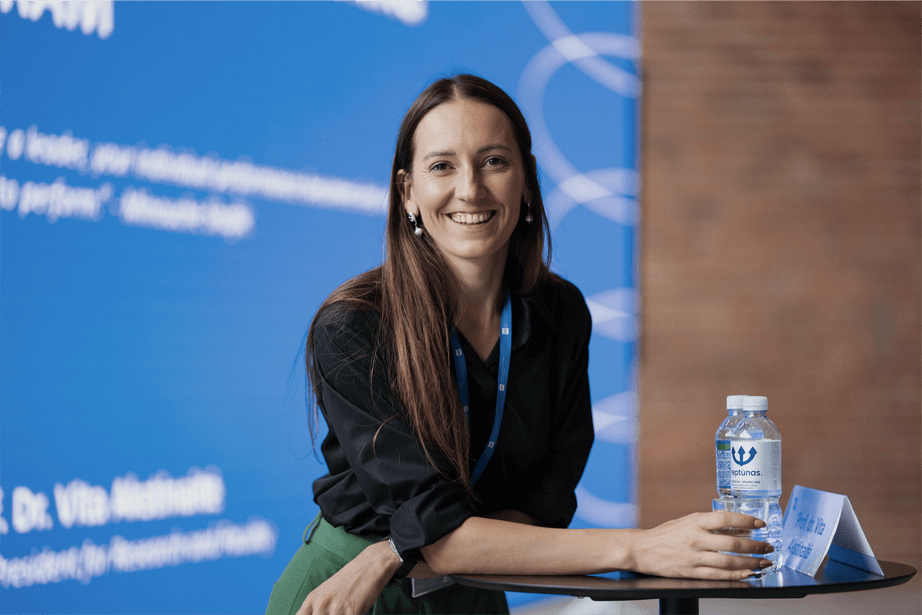ISM University is proud to share incredible news - our researcher Dr. Vita Akstinaitė has just won the esteemed Marie Curie Postdoctoral Fellowship for her research project on “Leading in the brave new world: human - robot dynamics”.
With over 8,000 applicants in 2023, the Fellowship aims to help provide PhD researchers opportunities and new skills discoveries abroad.
“Marie Curie fellowships are seen as a mark of researcher’s excellence internationally. The idea of Marie Curie is that you get funded to solve an important global challenge. The challenge I will be solving is about our soon-to-be new reality where AI and robots will become an inseparable part of our lives. Hence, we need to know the answers: What leadership skills do you need to lead human-AI teams? How can humans-AI work symbiotically? How do team dynamics and effectiveness change in human-AI teams? Winning Marie Curie for me is an extremely important milestone to work on the topic that really matters,” shares Dr. Vita Akstinaitė.
Learn more about Dr. Akstinaitė’s project:
Although there is plenty of training on how to use technology, no one is teaching leaders how to lead it, thus creating skills gaps and workforce adaptability issues. As organisations face digital disruption, leaders must integrate these digital innovations into their operations and inspire their teams to become “technologically savvy”. However, despite the pressing need to better understand how to cultivate cohesive team dynamics amidst human and AI entities, research in this field is limited, which is problematic as leaders lack evidence-based solutions to deal with these novel challenges. Therefore, this project aims to unlock the potential of human-AI collaboration by:

This research integrates the scientific fields of leadership, organisational psychology and IT, which pushes the boundaries of traditional research domains. Moreover, it is built on the newest technological trends and employs cutting-edge deep neural network technologies offering a state-of-the-art exploration of the subject. All in all, by achieving these objectives, this project will reshape the future of work, empowering organisations to harness the full potential of human/AI teams, enhance leadership capabilities, and optimise team dynamics in this ‘brave new world’ of workplace digitalisation.
ISM University is proud to share incredible news - our researcher Dr. Vita Akstinaitė has just won the esteemed Marie Curie Postdoctoral Fellowship for her research project on “Leading in the brave new world: human - robot dynamics”.
With over 8,000 applicants in 2023, the Fellowship aims to help provide PhD researchers opportunities and new skills discoveries abroad.
“Marie Curie fellowships are seen as a mark of researcher’s excellence internationally. The idea of Marie Curie is that you get funded to solve an important global challenge. The challenge I will be solving is about our soon-to-be new reality where AI and robots will become an inseparable part of our lives. Hence, we need to know the answers: What leadership skills do you need to lead human-AI teams? How can humans-AI work symbiotically? How do team dynamics and effectiveness change in human-AI teams? Winning Marie Curie for me is an extremely important milestone to work on the topic that really matters,” shares Dr. Vita Akstinaitė.
Learn more about Dr. Akstinaitė’s project:
Although there is plenty of training on how to use technology, no one is teaching leaders how to lead it, thus creating skills gaps and workforce adaptability issues. As organisations face digital disruption, leaders must integrate these digital innovations into their operations and inspire their teams to become “technologically savvy”. However, despite the pressing need to better understand how to cultivate cohesive team dynamics amidst human and AI entities, research in this field is limited, which is problematic as leaders lack evidence-based solutions to deal with these novel challenges. Therefore, this project aims to unlock the potential of human-AI collaboration by:

This research integrates the scientific fields of leadership, organisational psychology and IT, which pushes the boundaries of traditional research domains. Moreover, it is built on the newest technological trends and employs cutting-edge deep neural network technologies offering a state-of-the-art exploration of the subject. All in all, by achieving these objectives, this project will reshape the future of work, empowering organisations to harness the full potential of human/AI teams, enhance leadership capabilities, and optimise team dynamics in this ‘brave new world’ of workplace digitalisation.